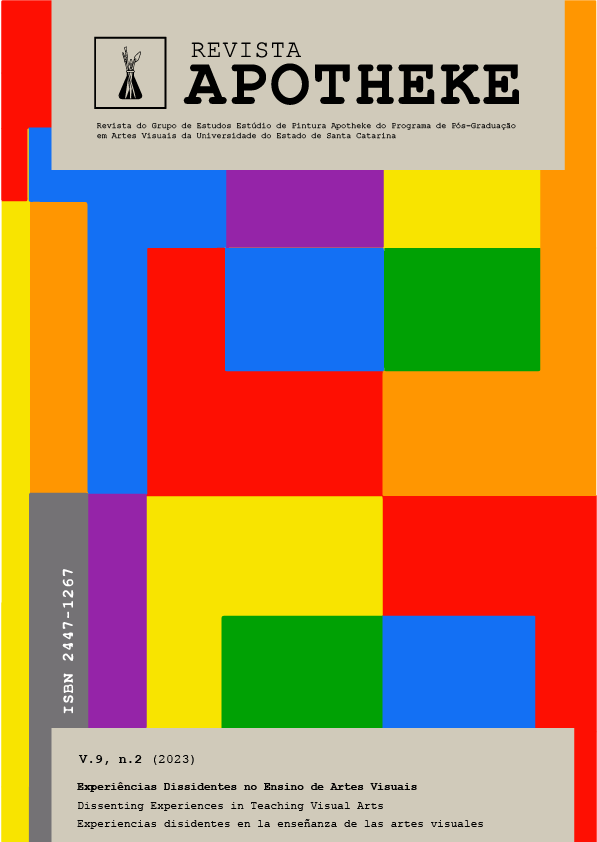Experience, art and education from Dewey's analytical perspective
DOI:
https://doi.org/10.5965/24471267922023152Keywords:
education, art, experience, DeweyAbstract
The text consists of seven parts starting from an introduction in which the bibliographical proposal is presented, basically developing through John Dewey's references that deal with the theme involving art and education, based on the concept of experience. After exposing some theoretical and biographical information about the author, we start with the problem of dualisms present in our culture, since the Greeks, which led to a disregard of experience in favor of the dimension of theory, privileged locus of truth. In this sense, art being in the context of human practice, it developed in empiricism, locating itself in a dimension of inferiority compared to the noble activities of the spirit, whose contemplation was understood as the source of true scientific knowledge. This understanding of human knowledge generated difficulties that are still observed in a markedly elitist and prejudiced unfair classification. Such prejudices demand urgent formative work from education so that Dewey's prophecy does not come true, according to which, if workers do not appropriate the fundamentals of their activities, they will easily become mere appendages of technology and the machines that operate. Intending to make the philosophy of education essentially accessible and closely linked to pedagogical practices, Dewey starts from the experience vitally associated with human and social development, as long as it presents an aesthetic quality that makes it unique and is a guarantee of procedural, constant and truly educational growth. We realize the importance of art in education alongside science and philosophy, for the improvement of increasingly advanced thinking to face the problems present in the world of experiences.
Downloads
References
DEWEY, John. Democracia e educação. 2 a . ed. Trad. Godofredo Range & Anísio Teixeira. São Paulo: Companhia Editora Nacional, 1952.
DEWEY, John. Reconstruction in philosophy. Enlarged edition. Boston: Beacon Press, 1957.
DEWEY, John. Experiência e natureza – Textos selecionados. Trad. Murilo Otávio R. P. Leme. São Paulo: Abril S.A. Cultural e Industrial, 1974.
DEWEY, John. Experiência e educação. 3 a . ed. Trad. Anísio Teixeira. São Paulo: Companhia Editora Nacional, 1979.
DEWEY, John. Cultura e indústria na educação. In: BARBOSA, Ana M. John Dewey e o ensino da arte no Brasil. 3 a . ed. Trad. Ângela Fontes. São Paulo: Editora Cortez, 2001, p. 23-32.
DEWEY, John. A arte como experiência. Trad. Vera Ribeiro. São Paulo: Martins Fontes, 2010.
SOUZA, R. A de; MARTINELI, T. A. P. Considerações históricas sobre a influência de John Dewey no pensamento pedagógico brasileiro. Revista HISTEDBR on-line, Campinas, n. 35, p. 160-162, set. 2009.
Downloads
Published
How to Cite
Issue
Section
License
Copyright (c) 2023 Leoni Maria Padilha Henning

This work is licensed under a Creative Commons Attribution-NonCommercial 4.0 International License.
Copyright and Licensing Policy
Authors of works submitted to Revista APOTHEKE authorize their publication in both print and digital formats exclusively for academic purposes. Reproduction is permitted, provided that the source is properly cited. Authors confirm the originality, authorship, and unpublished status of their manuscripts.
Articles published by the journal are freely available and intended for academic and non-commercial use only. All copyrights are transferred to the journal. The content of signed articles reflects the views of their respective authors and not the official position of Revista Apotheke. The author(s) agree to always cite the following reference when republishing or referring to the content originally published in Revista Apotheke:
“This article was originally published by Revista Apotheke in volume (insert volume), number (insert number), year (insert year), and is available at: http://www.revistas.udesc.br/index.php/APOTHEKE/index”
It is the sole responsibility of the authors to obtain written permission for the use of any material protected by copyright law included in their articles. Revista Apotheke is not responsible for copyright infringements committed by contributors.
Authors retain copyright and grant the journal the right of first publication, with the work licensed under a Creative Commons Attribution-NonCommercial License (CC BY-NC):
-
Attribution (BY): Licensees are allowed to copy, distribute, display, perform, and create derivative works, provided that proper credit is given to the author or licensor, in the manner specified.
-
NonCommercial (NC): Licensees may use the material only for non-commercial purposes.
After publication, authors retain the rights to their work and may republish the text.



